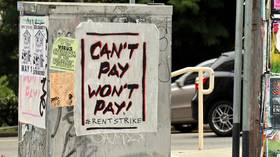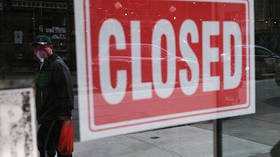Desperate New Yorkers mark May Day with CANCEL RENT protests at governor’s office & city landmarks (VIDEOS)

New Yorkers are staging demonstrations all over the state to demand reprieve from rent, honking their horns outside the governor’s mansion and unfurling banners from bridges as the Covid-19 shutdown devastates their finances.
The largest US rent strike in nearly a century began on Friday in New York as protesters descended on Governor Andrew Cuomo’s office in Albany with bullhorns, and displaying banners reading #CancelRent outside the State Capitol.
#CancelRent protest outside of NYS Capitol @CapitalTonightpic.twitter.com/ZEqH5S5xVw
— Morgan Mckay (@morganfmckay) May 1, 2020
Millions can’t pay rent today. We’re headed to @NYGovCuomo office to demand he #CancelRent.We can’t pay, we won’t pay it. #RentStrikepic.twitter.com/aq9oKT28P5
— New York Communities for Change (@nychange) May 1, 2020
Dozens of cars join #CancelRent protest at the State Capitol in Albany this morning #MayDay2020pic.twitter.com/bgZowB9CAx
— Michael Kink (@mkink) May 1, 2020
Their counterparts in New York City unfurled banners from buildings, and even bridges, in an effort to make public a form of strike that is by nature not as visible as the usual picket-lines and protest marches.
1151-1155 Dean Street Banner Drop! No work? NO RENT! #CancelRent *Huge thanks to @CrownHeightsAid for making a bunch of amazing banners for today! pic.twitter.com/U11ufgFKw5
— CHTU #CancelRent (@CHTenantUnion) May 1, 2020
It's the first of the month and May Day. Rent strikers dropped banners across Brooklyn. Cuomo still has not canceled rent, even as over 30 million people are unemployed nationally. #CancelRent#RentStrike#MayDayRead more here: https://t.co/I8MHNXVVtepic.twitter.com/NB5aAVncav
— Left Voice (@left_voice) May 1, 2020
I spy some truth from my window. #CancelRent#NYCpic.twitter.com/CSN2d7lp9A
— Leon 🦦 (@iamleonmallett) May 1, 2020
Others, in New York and elsewhere across the economically-stricken US, posted photos of themselves with protest signs. The Action Center on Race and the Economy launched WeStrikeTogether.org on Thursday to rally rent-strikers across the country and bolster virtual solidarity.
It's May 1st & our tenants still have to choose b/w taking care of their families or paying rent. That is not right. We will continue to fight harder & scream louder for the government to understand & meet our demands! CAAAV members demand @NYGovCuomo to #CancelRent! pic.twitter.com/D9OlVEaHSx
— CAAAV #CANCELRENT (@caaav) May 1, 2020
✊✊✊ pic.twitter.com/pIIYLeRA7U
— Crown Heights Mutual Aid (@CrownHeightsAid) May 1, 2020
A campaign coordinator for Housing Justice for All, one of the groups behind the strike, told the Intercept that over 400 families in New York buildings containing more than 1,500 units are each leading building-wide rent strikes. More than 13,000 people have signed on to a petition pledging not to pay their rent in May, demanding Cuomo cancel the payments for as long as the pandemic lasts, or for four months – whichever is longer. While many of those signing are unable to pay even if they wanted to, the coalition of tenants’ rights advocates and other groups backing the protest has also called on those who can pay to withhold those payments in protest. Only 55.7 percent of New Yorkers surveyed by PropertyNest expected to be able to pay their rent “as usual” in May.
A three-month eviction moratorium is scheduled to expire in late June, potentially putting millions at risk of losing their homes. At the same time, Cuomo has actually increased the financial burden on New York City residents, shuttering the normally 24-hour subway system between the hours of 1am and 4am, ostensibly for cleaning. While the measure is nominally motivated by the coronavirus pandemic, its other target – the city’s large homeless population which often uses the trains as shelter – will not vanish when the virus does. Many New Yorkers do not own cars and fear the trains will remain shuttered, preventing them from commuting affordably at night – a must for many low-income workers.
Also on rt.com Class war in the making? Coronavirus quarantines pit well-off hermits against serfs who supply themWhile the inhabitants of its home city struggle to keep a roof over their heads, the New York Times has unsurprisingly sided with landlords, quoting a representative from the Rent Stabilization Association – a landlords’ group – warning that a rent strike would “create an economic and housing pandemic,” causing the city to “crumble into an economic abyss worse than the 1970s, when New York was the national poster child for urban blight.”
But most New Yorkers are wrestling with larger problems than concern for how their city is viewed by the rest of the country. The rent strikers were joined on May Day by workers at Walmart, Amazon, Whole Foods, FedEx, Target, and Instacart, who planned to call in sick or stage walkouts nationwide to demand better employee protection during the coronavirus pandemic.
Workers at many of those companies have been protesting intermittently for the past month with similar demonstrations, though they have secured few concessions from their employers. Record job losses associated with the pandemic-related shutdown – over 30 million Americans have filed for unemployment in the past six weeks – means an endless pool of workers to draw from in the event that some become fed up with working conditions.
Like this story? Share it with a friend!














